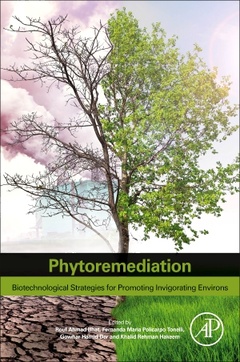Description
Phytoremediation
Biotechnological Strategies for Promoting Invigorating Environs
Coordinators: Bhat Rouf Ahmad, Policarpo Tonelli Fernanda Maria, Dar Gowhar Hamid, Hakeem Khalid Rehman
Language: English
Subject for Phytoremediation:
538 p. · 15.2x22.8 cm · Paperback
Description
/li>Contents
/li>Biography
/li>Comment
/li>
Phytoremediation: Biotechnological Strategies for Promoting Invigorating Environs focuses on phytoremediation?s history, present and future potential, discussing mechanisms of remediation, different types of pollutant and polluted environs, cell signaling, biotechnology, and molecular biology, including site-directed DNA and the omics related to plant sciences. Sections focus on phytoremediation as an economically feasible and environmentally safe strategy, including its mechanisms from macroscopic to microscopic level, strategies of assisted phytoremediation, the role of omics on innovations on the field, the development of genetically modified plants (GMPs) to deal with pollutants, the future prospects of targeted genetic engineering in phytoremediation and remediation advantages and disadvantages.
Other sections in the book explore the phytoremediation of specific environs (water and soil) and specific contaminants that are of major worldwide concern.
1. The History of Phytoremediation
2. Potentially Toxic Elements and Phytoremediation: Opportunities and Challenges
3. Mechanisms of phytoremediation
4. Phytoremediation at Molecular level
5. Microbial Assisted Phytoremediation
6. Nano-phytoremediation for Soil contamination: An Emerging Approach for Revitalizing the Tarnished Resource
7. Biomass amendments and phytoremediation of environmental pollutants
8. Chemical amendments and Phytoremediation
9. Omics and Phytoremediation
10. Recent advancement in Plant genetic engineering for efficient phytoremediation
11. Targeted genetic modification technologies: potential benefits of their future use in phytoremediation
12. Benefits and Limitations of Phytoremediation: Heavy Metal Remediation Review
13. Phytoremediation of Soil and Water
14. Rhizoremediation of petroleum hydrocarbon contaminated soils: A systematic review of mutualism between phytoremediation species and soil living microorganisms
15. Ecotoxicity of Nickel and its Possible Remediation
16. Phytoremediation of pesticides
17. Nature sucks up Explosives
18. Phytoremediation: An alternative approach for removal of dyes
19. Phytoremediation of Pharmaceutical Wastes
20. Phytoremediation of Persistent Organic Pollutants (POPs)
21. Role of Biotechnology in Phytoremediation
22. Engineering plants for Metal Tolerance and Accumulation
23. Economic Feasibility of Phytoremediation
Dr. Fernanda Maria Policarpo Tonelli (Ph.D) is specialized in Biotechnology/Molecular Biology and has been studying nanomaterials applications such as delivery and remediation. Has worked with engineered viral particles and nanomaterials functionalized by different protocols (gold nanorods, carbon nanotubes, carbon-dots, nanoparticles, nanographene oxide) that resulted in 10 patent applications. She teaches topics related to Biochemistry and Biotechnology/Molecular Biology to graduate students as an associate professor at Federal University of São João del Rei. Dr. Tonelli has edited and/or authored 3 books, has reviewed various articles/book proposals, has authored 12 scientific articles and more than 20 book chapters from international publishers. The main topics addressed in the publications are: nanomaterials, gene delivery strategies, remediation strategies and cell signaling. She has presented and participated in numerous national and international conferences and has also had the opportunity to contribute to the organization of various scientific events. Dr. Tonelli has also dedicated herself to promote Science and Technology co-funding an ONG with this purpose and also joining a scientific divulgation group composed only by women. She has had her efforts as a researcher recognized by various awards
- Presents phytoremediation mechanisms at a microscopic level (molecular mechanisms)
- Covers remediation in different environs and in different kinds of pollutants
- Conveys the economic aspects relating to phytoremediation




